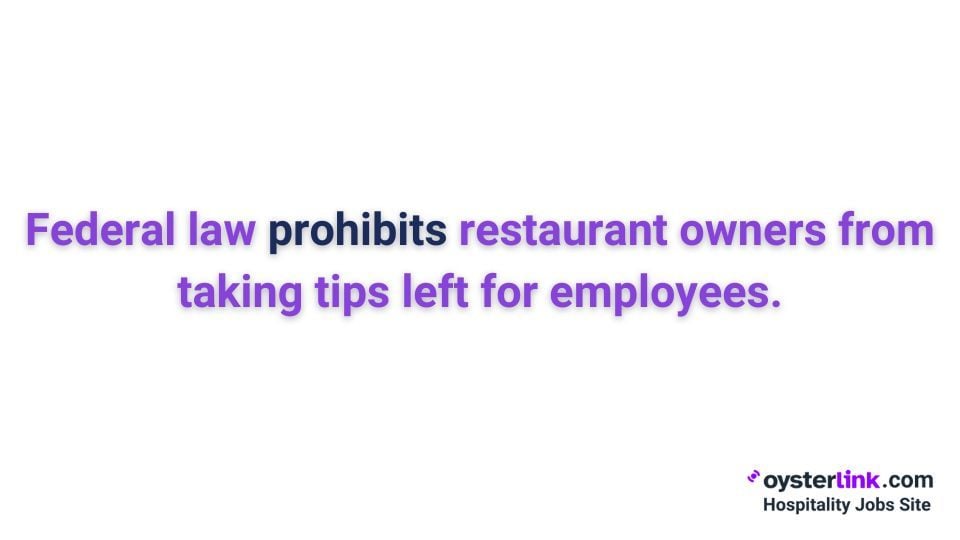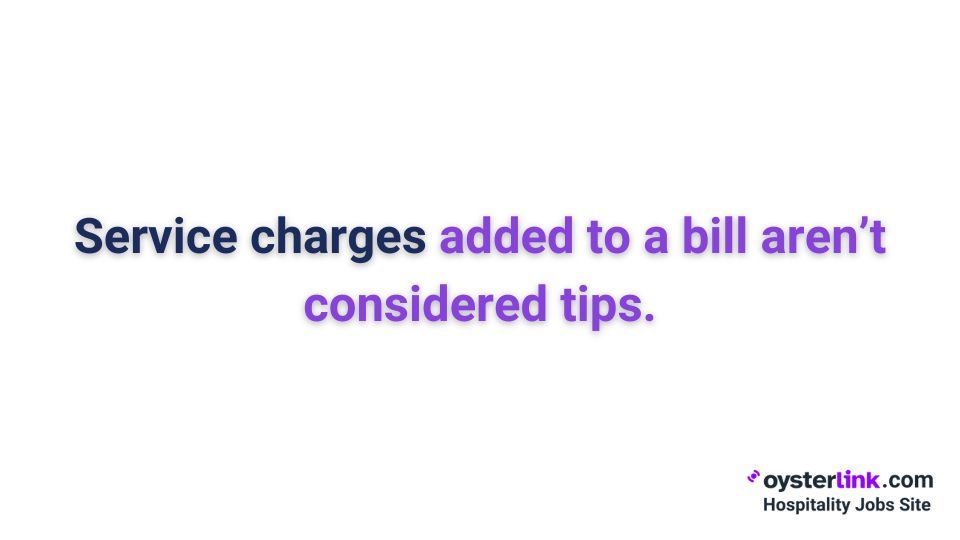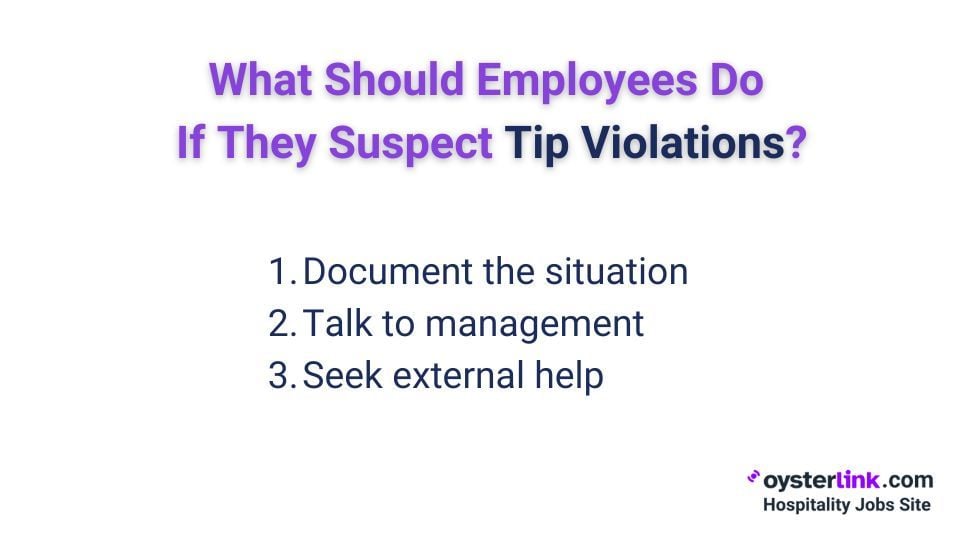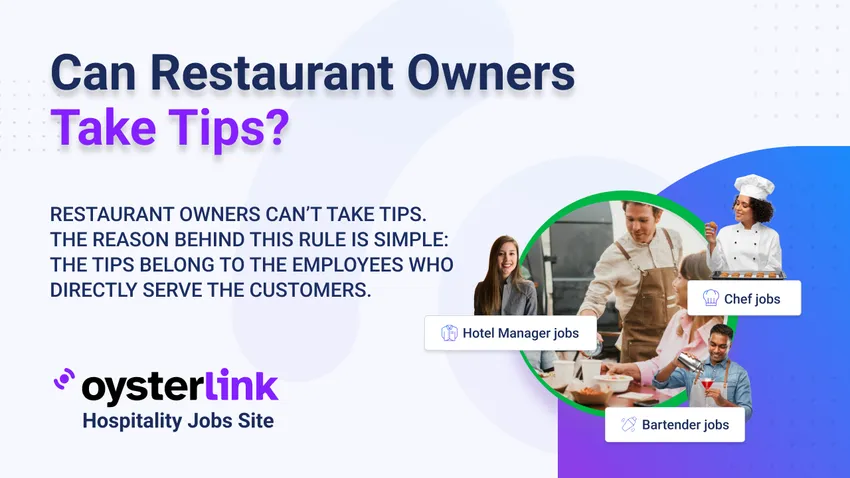Tipping is a fundamental part of the U.S. restaurant industry, but the rules about who gets to keep those tips can be unclear — especially when it comes to restaurant owners, managers and other key staff members.
So, can restaurant owners take tips?
The simple answer is no — but there's more to the story. Tipping laws are designed to protect workers, ensuring that employees who rely on tips receive them and that owners don’t misuse this crucial source of income.
Whether you're an owner wondering about your legal obligations or an employee trying to understand your rights, it’s important to know how these rules work.
Understanding Tipping in the United States
Tipping in the U.S. is both a cultural practice and a significant part of many restaurant workers’ income.
In some industries, tipping is optional, but in restaurants, it's practically expected. Employees in certain roles, like Servers and Bartenders, rely on tips to make up a large portion of their wages.
The money left by customers isn’t just a nice bonus for service workers — it’s often an essential part of their livelihood.
This is where tipping laws come into play, helping ensure that tips go to the right people and preventing misuse of this income by restaurant owners or managers.
The Legal Background of Tipping in the US
The Fair Labor Standards Act (FLSA) sets the foundation for many of the federal regulations regarding tipping. This law governs minimum wage, overtime and tipped wages.
Under the FLSA, restaurant employees who earn tips (like Bartenders and Waiters/Waitresses) can be paid a lower hourly wage than those who don’t, as long as their tips make up the difference to meet the federal minimum wage.
However, not all tips are treated equally, and this is where state-specific laws can come into play.
Some states, like California, have stricter laws about tipping, ensuring that tips remain solely with the employees who earned them.
Can Restaurant Owners Take Tips?
So, can restaurant owners take tips? No, federal law prohibits restaurant owners from taking tips left for employees.
The reason behind this rule is simple: The tips belong to the employees who directly serve the customers.
Owners and operators are considered separate from the front-line service roles and thus are not entitled to share in the tips.

The law also extends this prohibition to managers and supervisors. Even if they are involved in the day-to-day operations of the restaurant, they still can’t collect tips.
The only exception is if they’re actively serving customers and their role doesn't include managerial duties.
Who Is Allowed To Take Tips?
In the restaurant industry, tips are typically reserved for employees who interact directly with customers. Here’s a list of roles that are typically eligible for tips:
- Servers
- Bartenders
- Bussers
- Food Runners
- Hosts/Hostesses (in some cases)
- Valets (in some cases)
In some restaurants, Hosts/Hostesses and Valets are seen as part of the customer service team, making them eligible for tips.
However, whether they receive tips often depends on the restaurant’s policy.
Non-tipped employees, such as kitchen staff and managers, are generally excluded from receiving tips. However, there are some exceptions, especially when it comes to tip pooling.
Tip Pooling: What Restaurant Owners and Employees Need To Know
Tip pooling is a practice where all tips collected by staff are pooled together and then redistributed among all workers, often based on the hours worked or the role they perform.
This practice is intended to ensure fair distribution, especially in restaurants where back-of-house employees (who don’t directly interact with customers) are contributing to the overall dining experience.
Under the FLSA, tip pooling is legal as long as it follows certain rules:
- Tipped employees: Only employees who regularly receive tips can participate in the pool. That means Servers, Bartenders and other front-line employees are eligible.
- Managers and supervisors: As noted, they cannot be part of the tip pool. This is an area where owners need to be careful, as violating this rule can lead to legal trouble.
- Back-of-house workers: Kitchen staff, Dishwashers and others who don’t interact directly with customers can participate in the tip pool, but only if the restaurant is following the legal guidelines.
The benefits of tip pooling include a more equitable distribution of tips and the ability to reward all employees who contribute to the customer experience.
However, tip pooling can also create challenges — especially if employees feel the system isn’t fair or if there’s confusion over the distribution.
For more information, read our full guide on tip pooling and tip splitting.
Common Misunderstandings About Tip Ownership
There are some common misunderstandings when it comes to tips and who owns them.
For example, service charges added to a bill aren’t considered tips and are typically retained by the restaurant.

Many customers assume these service charges go directly to the employees, but that’s not always the case.
It’s important for both employees and owners to understand the difference between a service charge and a voluntary tip, as they are treated differently under the law.
Another point of confusion is whether owners or managers can take a share of tips via the tip pool.
As explained earlier, they are excluded from participating in the pool because they hold managerial positions.
In some cases, owners might try to circumvent this by structuring compensation differently, but such practices can lead to legal repercussions.
Consequences of Violating Tipping Laws
For restaurant owners, violating tipping laws can have serious consequences.
If an owner or manager is found to be improperly taking tips, they could face legal action, including lawsuits and fines. The penalties can be costly, both in terms of money and reputation.
For employees, violations of tipping laws can result in lost wages, dissatisfaction and a toxic work environment.
Employees who believe their tips are being misused have the right to report these violations and seek compensation.
Legal routes include contacting the Department of Labor or consulting with an attorney.
Best Practices for Restaurant Owners
To avoid running into trouble, restaurant owners should take a proactive approach to understanding and following tipping laws:
- Policy transparency: Be clear with your employees about how tips are handled. This transparency fosters trust and ensures everyone understands their rights and responsibilities.
- Regular training: Ensure that both managers and staff are regularly trained on tipping laws and policies. This reduces confusion and helps everyone stay on the same page.
- Audit practices: Periodically review your tip distribution practices to ensure compliance with the law. Regular audits help identify potential issues before they become legal problems.
What Should Employees Do If They Suspect Tip Violations?
If you’re an employee and suspect that your tips aren’t being handled correctly, there are steps you can take:
- Document the situation: Keep a record of the tips you’ve earned and any discrepancies you notice.
- Talk to management: Often, issues can be resolved through open communication with your employer.
- Seek external help: If you’re unable to resolve the issue internally, you may need to contact the Department of Labor or seek legal assistance.
Helpful resources for employees include labor boards, hospitality unions and legal aid organizations.

The Bottom Line: Keeping Tips Fair and Legal
So, can restaurant owners take tips? The answer is clear: No, owners cannot take tips meant for employees.
Ensuring that tips go to the right people — whether through direct tips or tip pooling — is essential for a fair and legally compliant workplace.
By following the laws and best practices, restaurant owners can foster a transparent, respectful environment for both staff and customers.
For restaurant owners seeking guidance on creating a positive work culture and staying compliant with labor laws, OysterLink is the way to go.
With industry insights and career advice, OysterLink helps you navigate the complexities of the hospitality industry with ease.











Loading comments...